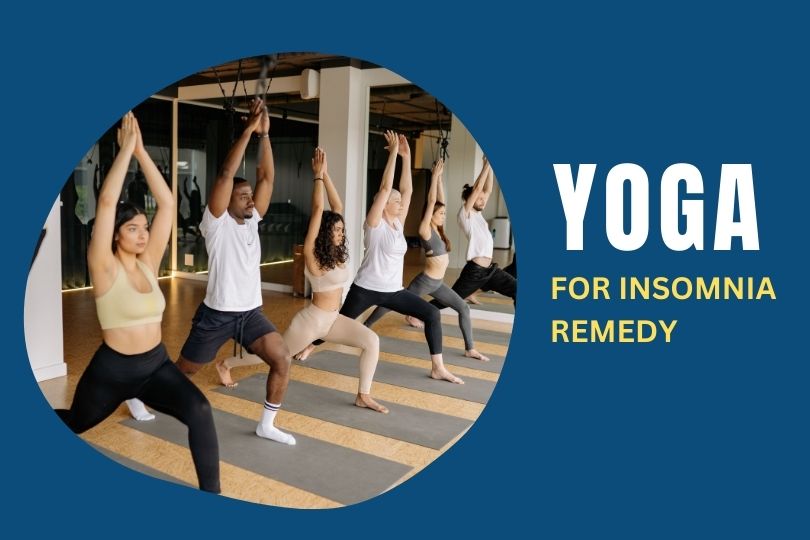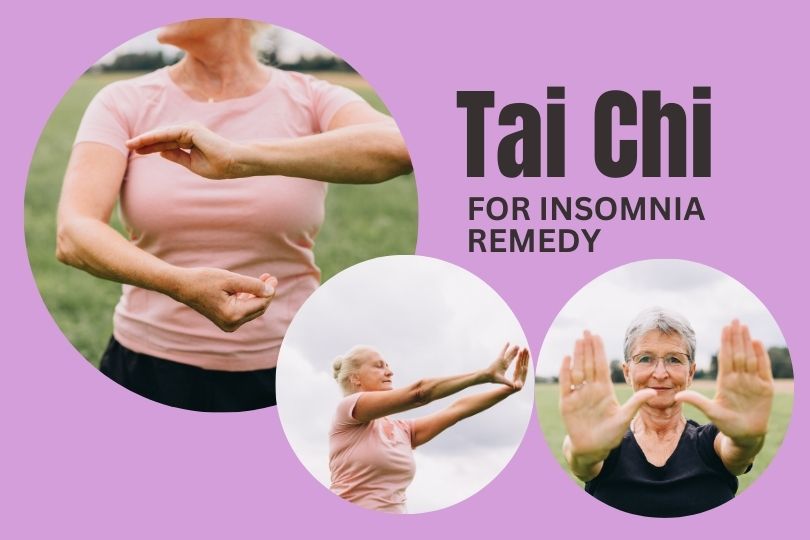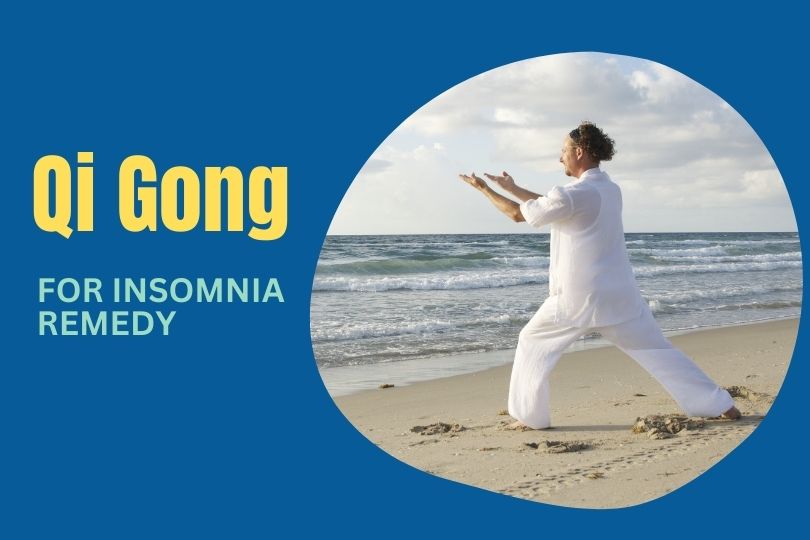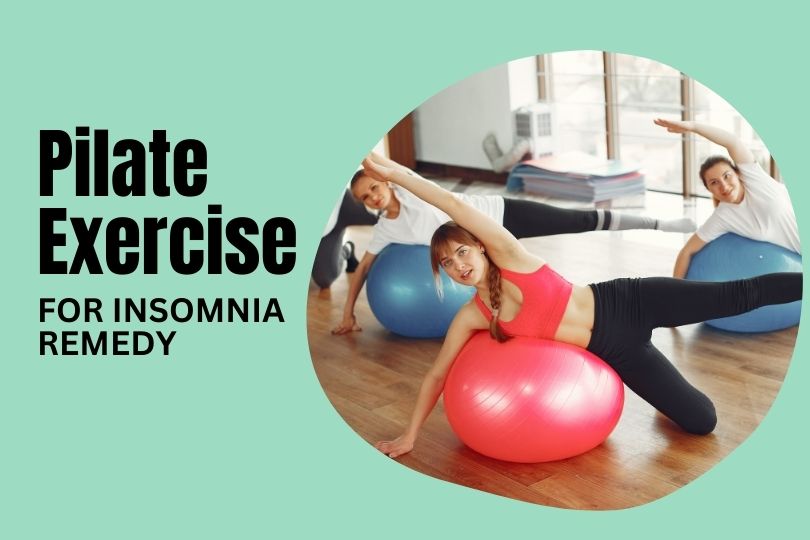Finding relief from insomnia, a sleeping disorder can be a stressful and draining experience, but it isn't always necessary to take medication. Many people prefer using organic ways to cure Insomnia. Because they have proven natural solutions instead of drugs to encourage better sleep. Thankfully, there are several efficient drug-free methods for treating insomnia.
We'll look at the best six all-natural treatments for insomnia in this article. These tactics offer helpful substitutes for getting deep and rejuvenating sleep, from developing healthy sleep habits and practicing relaxation techniques to using particular foods and herbs.
If you are familiar with the causes and effects of Insomnia, these powerful tips may make progress in eliminating your insomnia. And, definitely help you obtain better sleep quality by including these natural remedies in your daily routine.
The 6 Powerful Natural Remedies For Curing Insomnia
Here are six natural remedies for insomnia that you can try every day to get a decent night's rest:
1. Yoga for Insomnia Solution
What role does yoga play in treating insomnia? Here is how.

Yoga transforms physical flexibility that helps to reduce insomnia!
For certain individuals worldwide, insomnia equals panic. Ninety-seven percent of responders to a Sleep Foundation survey claim to have pain at least once a week. In this regard, yoga is a useful adjunctive strategy for controlling and treating insomnia.
Yoga includes physical positions, breathing techniques, and meditation strategies that encourage calmness, lessen stress, and enhance general well-being. Here's how yoga can help with insomnia:
- Stress Reduction: Yoga stimulates the parasympathetic nerve system, which in turn promotes the relaxation response in the body. Regular yoga practice can help people sleep better by lowering stress levels, calming the mind, and fostering a sense of inner serenity.
- Physical Relaxation: Stretching and releasing tension from the body are common elements of yoga positions (asanas), which can help ease pain and relax the muscles. This physical unwinding may help you sleep more comfortably and soundly.
- Regulation of Breathing: Yoga uses particular breathing exercises called pranayama that emphasize slow, deep breathing under control. These methods aid in triggering the relaxation response, lowering anxiety, and encouraging a tranquil state of mind that is beneficial to sleep.
- Improved Sleep Quality: Improved sleep quality has been linked to regular yoga practice. According to studies, those who practice yoga have longer sleep durations overall, shorter sleep onset latency (time to fall asleep), fewer sleep disruptions, and greater sleep efficiency.
- Stress and Anxiety Management: Sleep problems are frequently linked to stress and anxiety. By encouraging mindfulness, developing present-moment awareness, and lowering rumination and worry—all of which can improve sleep—yoga can assist people in managing these psychological issues.
- Mind-Body Connection: Yoga places a strong emphasis on the mind-body connection, enabling people to become more aware of their bodies and sensations. This increased awareness can aid people in recognizing and treating any physical pain or tension that may be causing them to have trouble falling asleep.
- Regulation of Circadian Rhythms: Regular yoga practice can assist in regulating the body's circadian rhythms, the internal biological clock that controls sleep-wake cycles. This is especially true in the morning or early evening. A regimen can make it simpler to go to sleep and wake up at the ideal times by synchronizing the body's natural sleep-wake cycles.
When incorporating yoga for insomnia, consider the following tips:
- Instead of energetically and stimulatingly practicing yoga, it should be done gradually and restoratively.
- Yoga should be practiced at least a couple of hours before bedtime to help the body and mind relax.
- To determine what works best for you, try out various positions, breathing exercises, and guided meditation approaches.
- Think about joining a yoga class or working with a qualified yoga instructor who can show you the right poses and modifications for your needs.
Although yoga may help with insomnia, it's still advisable to speak with a doctor if the problem persists despite trying several remedies or if you have any underlying medical concerns. They can offer you individualized advice and assistance for incorporating yoga into your entire sleep hygiene strategy.
2. Tai Chi for Insomnia Solution
How does Tai Chi help with insomnia problems? This is how.

Tai Chi - One of the best holistic ways like Yoga to cure insomnia!
The ancient Chinese martial art discipline of tai chi can be beneficial for treating insomnia and enhancing sleep quality. It blends gentle movements, in-depth breathing, and concentrated concentration to encourage relaxation, lower stress levels, and promote general well-being.
Here are several ways Tai Chi can help with insomnia:
- Stress Reduction: Deep breathing and slow, flowing motions, which are emphasized in tai chi, can help trigger the relaxation response and lower stress levels. People who practice Tai Chi can calm their minds, release stress, and achieve an inner serenity that is favorable to sleeping by practicing its focused and meditative elements.
- Physical Relaxation: Tai Chi is a gentle, low-impact exercise that enhances physical health and promotes relaxation. Tai chi exercises can ease physical stress, lessen bodily aches, and promote physical relaxation, all of which can improve the quality of your sleep.
- Mindfulness and Body Awareness: Tai chi emphasizes deliberate movement and a laser-like focus on the body and its feelings. By practicing present-moment awareness, people can refocus their attention away from bothersome thoughts and worries, resulting in a calm mental state that can help people go to sleep.
- Regulation of Breathing: Deep, diaphragmatic breathing methods are used in tai chi. These deliberate, slow breathing techniques assist in triggering the relaxation response, lowering physiological arousal, and bringing on a peacefulness that may aid in falling asleep.
- Energy Flow and Balance: Traditional Chinese medicine states that the goal of Tai Chi is to balance the body's energy (Qi) flow. Individuals can repair imbalances, encourage harmonious energy flow, and perhaps even lessen elements that might interfere with sleep by practicing Tai Chi.
- Enhanced Mind-Body Connection: Tai chi promotes a strong mental and physical connection. People might develop a greater awareness of their bodily and mental situations via consistent practice. This self-awareness can assist in identifying and addressing causes, such as tension, discomfort, or racing thoughts, that may lead to sleep disruptions.
- Improved Emotional Well-being: Sleep problems are frequently related to emotional issues like melancholy, anxiety, and mood swings. By lowering anxiety, easing depressed symptoms, and encouraging a positive outlook, Tai Chi has been demonstrated to increase emotional well-being, all of which can improve the quality of sleep.
Take into account the following advice when practicing Tai Chi to combat insomnia:
- To acquire the right techniques and motions, choose a trained instructor or enroll in Tai Chi lessons.
- Tai chi should be practiced whenever it is most convenient for you, ideally during the day or in the early evening to avoid overstimulating the body before bed.
- Start with shorter practice sessions and gradually lengthen them as you gain skill and comfort.
- Pay attention to your body's limitations and adjust your actions as necessary to account for any discomfort or physical restrictions.
To explore including Tai Chi in your sleep management plan, as with any supplementary practice, it's vital to speak with a healthcare provider or sleep specialist, especially if you have any underlying medical concerns or if insomnia persists.
They can offer individualized advice and assistance for including Tai Chi as a component of a comprehensive strategy for enhancing sleep in a natural way.
3. Qi Gong for Insomnia Solution
How may Qi Gong aid in treating insomnia? This is how.

Qi Gong is a smart way to cure insomnia problem!
Another traditional Chinese practice called Qi Gong helps control and treat insomnia. To nurture and balance the body's life energy (Qi), Qi Gong includes mild movements, breathing exercises, and meditation. It encourages rest, lessens tension, and improves general well-being.
Here are some ways that Qi Gong can help with insomnia:
- Stress Reduction: Deep breathing, soft movements, and mental relaxation are the main focuses of Qi Gong exercises. People who use these strategies can increase their body's relaxation response, lower their stress levels, and develop tranquility that aids in better sleep.
- Energy Cultivation and Balance: The goal of qi gong is to balance and harmonize the body's energy flow. People can cultivate and control the flow of Qi by using certain exercises, breathwork, and visualization, resolving any imbalances that might affect sleep patterns.
- Physical Relaxation: The flowing, leisurely movements of the qi gong help to release stress, promote physical relaxation, and reduce muscle stiffness. People who practice Qi Gong can reduce physical pain, enabling more comfortable and peaceful sleep.
- Breath Control and Meditation: Numerous breathing techniques, including deep diaphragmatic breathing and abdominal breathing, are incorporated into qi gong. These breathing techniques increase the quality of sleep by calming the nervous system, encouraging relaxation, and reducing anxiety.
- Mindfulness and Mental Clarity: Focused attention and awareness in the present moment are key components of qigong. By engaging in Qi Gong practice, people can calm their minds, lessen mental chatter, and achieve a state of mental clarity, which can assist to calm their racing thoughts and encourage a peaceful condition suitable for sleep.
- Emotional Balance: Anxiety, stress, and despair are some of the emotional elements that are frequently linked to insomnia. Qi Gong can aid in emotional regulation, encourage emotional balance, and lessen unfavorable emotions that could otherwise keep you up at night.
- Improved Body Awareness: Body awareness is developed by Qi Gong, enabling practitioners to tune into and connect with their physical experiences. This improved awareness can aid in locating uncomfortable or tense places, allowing people to unwind and achieve a more calm state that promotes sounder sleep.
Consider the following suggestions when using Qi Gong to fight insomnia:
- To acquire the right techniques and motions, get advice from a certified instructor or take part in Qi Gong workshops.
- Qi Gong should be practiced in a distraction-free, calm setting.
- Establish a consistent practice schedule and allot a specific period each day for Qi Gong activities.
- Start with easier and more fundamental moves and work your way up to more complex ones as you gain familiarity and experience.
- Practice at your own pace while paying attention to your body, respecting your boundaries, and modifying your motions as necessary.
As with any alternative therapy, it's crucial to speak with a healthcare provider or sleep expert, especially if you have underlying medical issues or if your insomnia persists despite trying several different strategies. Incorporating Qi Gong into your entire sleep management strategy, they may offer you personalized advice and support.
4. Pilate Exercise for Insomnia Solution
Here's explained how Pilates exercises can aid in the treatment of insomnia!

Pilate to cure insomnia for sleeping a good night's sleep!
People with insomnia may benefit from regulating and increasing their sleep by engaging in Pilates, a workout style that emphasizes core strength, flexibility, and body awareness. Pilates can have a great effect on physical and mental well-being in general, which can help with improved sleep, even though it may not target sleep-related concerns specifically.
Here are several ways that Pilates could help in reducing insomnia:
- Physical Relaxation: Pilates routines frequently incorporate controlled, deliberate motions that encourage muscle release and relaxation. By engaging in Pilates exercises, people can reduce physical pain and achieve a more calm state, which makes it simpler to rest and go to sleep.
- Stress Reduction: Participating in Pilates can help lower stress levels and encourage relaxation. Deep breathing exercises and the focused, thoughtful character of Pilates exercises help trigger the body's relaxation response and reduce stress, which is frequently linked to sleeplessness.
- Body Awareness and Alignment: Pilates places a strong emphasis on posture, good alignment, and body awareness. By engaging in Pilates exercises, people can correct their overall body alignment and lessen any physical discomfort or imbalances that might be interfering with their ability to fall asleep. Better alignment can increase physical comfort when sleeping and lessen the chance of experiencing pain or discomfort when you wake up.
- Improved Core Strength and Stability: Pilates workouts emphasize core stability and strength by focusing on the deep core muscles. A stronger core can improve posture and general body support, which can increase physical comfort and reduce muscle stress, both of which can improve the quality of sleep.
- Mindfulness and Mental Focus: Pilates calls for mental focus, mindfulness, and emphasis on exact breathing and movement patterns. People can develop mental clarity, slow down their racing thoughts, and foster a peaceful frame of mind that facilitates sounder sleep by focusing their minds throughout practice.
- Increased Energy and Vitality: Regular Pilates sessions can increase vitality, increase energy, and enhance overall physical health. A better sleep-wake cycle, which makes it simpler to fall asleep and wake up feeling rested, can be facilitated by having more energy during the day.
- Improved Body Image and Self-Esteem: Sometimes, body image issues and low self-esteem are linked to insomnia. Participating in Pilates and achieving gains in strength, flexibility, and body awareness can have a significant effect on one's body image and self-esteem, encouraging a more positive outlook and lowering fears or anxiety connected to sleep.
Consider these suggestions while adopting Pilates for insomnia:
- To guarantee correct form and technique, look for advice from a licensed Pilates instructor.
- Select Pilates routines that emphasize stretching, relaxation, and gentle movements instead of vigorous or provocative ones.
- Pilates should be done at least a couple hours before night to help the body and mind unwind.
- To encourage relaxation and stress reduction when exercising, incorporate mindful breathing techniques.
- To see results over time, be consistent in your Pilates practice and strive for many sessions.
Pilates can help you feel better overall, but if your insomnia persists or you have underlying medical concerns, you should speak with a doctor or sleep expert. They can offer you individualized advice and assistance as you include Pilates into your entire sleep hygiene strategy.
5. Organic Food for Insomnia Solution
Which foods work the best as remedies for insomnia? How is described here?

Food therapy plays vital role in Insomnia solution.
While there isn't a single item that would guarantee the eradication of insomnia, adopting a good and balanced diet can promote restful sleep. Certain foods provide nutrients that help people unwind, stimulate the synthesis of hormones that induce sleep, and improve the quality of their overall sleep.
The following foods may be useful for treating insomnia:
- Tart Cherries: Natural sources of melatonin, a hormone that controls sleep-wake cycles, include tart cherries. Better sleep may be facilitated by consuming sour cherry juice or tart cherries in their complete form.
- Kiwi: Kiwi is a good source of serotonin, folate, and antioxidants, all of which are good for sleep. Melatonin is synthesized from serotonin, and folate helps control sleep cycles. Having kiwis before bed may help you sleep better and fall asleep more quickly.
- Bananas: Magnesium and potassium, which are organic muscle relaxants, are found in bananas. Additionally, they contain tryptophan, an amino acid that aids in the stimulation of serotonin and melatonin synthesis. Including bananas in your diet may help you feel more at ease and fall asleep more easily.
- Whole Grains: Oats, quinoa, and brown rice are examples of whole grains with low glycemic indexes and high magnesium content that may help with relaxing. Consuming whole grains with your evening meal can encourage more stable sleep patterns and assist to control blood sugar levels.
- Fatty Fish: Salmon, trout, and sardines are among the fatty fish that are great suppliers of omega-3 fatty acids. Omega-3s have been linked to fewer sleep disruptions and better sleep quality. A few times a week of fatty fish in your diet may improve your ability to sleep.
- Herbal Teas: The relaxing effects of some herbal teas, such as chamomile, valerian root, lavender, and passionflower, might aid with relaxation. A warm cup of herbal tea can help establish a calming nighttime habit and get the body ready for sleep.
- Nuts and Seeds: Magnesium and tryptophan are two elements that are abundant in almonds, walnuts, flaxseeds, and chia seeds and can encourage improved sleep. They offer a combination of good fats, protein, and necessary minerals and can be eaten as a snack or added to meals.
It's vital to keep in mind that every person's reaction to food will be unique, so what works for one person could not work for another.
As they might disturb sleep, big meals, coffee, and spicy or acidic foods should also be avoided right before bed.
Maintaining a balanced diet, staying hydrated, and getting individualized dietary advice from a certified nutritionist or healthcare provider are always wise moves while trying to combat insomnia.
6. Best Practice Habits for Insomnia Solution
here is explained what are the most effective routines to prevent insomnia.

Keeping body hydrated may help reduce insomnia!
It's critical to create sound sleep hygiene routines to uphold healthy sleeping patterns and reduce the danger of insomnia. But healthy habits are organic ways to cure insomnia by practicing intuitively.
The following behaviors are suggested as ways to encourage regular, peaceful sleep:
- Stick to a Consistent Sleep Schedule: Every day, including weekends, set a consistent bedtime and wake-up time. This encourages a more regular sleep-wake cycle and assists in regulating your body's internal clock.
- Create a Sleep-Friendly Environment: Create a peaceful, cozy, and appealing sleeping environment in your bedroom. Maintain a quiet, dark, and cold atmosphere in the space. If necessary, use white noise machines, blackout drapes, earplugs, or other sleep aids.
- Establish a Relaxing Bedtime Routine: Create a bedtime routine that aids in your relaxation. Take a warm bath, read a book, listen to soothing music, or meditate. You can also try relaxing exercises like deep breathing or yoga. Your body receives a signal from consistency in your routine that it is time to unwind and get ready for sleep.
- Limit Exposure to Electronics and Blue Light: Avoid using computers, iPads, and other electronic devices right before bed. These devices' blue light can prevent the body's natural generation of sleep hormones. A digital curfew might be put in place at least one hour before bed.
- Avoid Stimulants: Avoid or limit your intake of alcohol, nicotine, and caffeine, especially in the evening. These substances have the potential to alter your sleep schedule and sleep quality.
- Exercise Regularly: Regular exercise is important, but you should attempt to finish your workout before going to bed. Better sleep is a result of physical activity, but exercising too soon before bed might make you more alert and hinder sleep.
- Manage Stress: Find practical strategies for stress management throughout the day. Add stress-relieving routines like yoga, mindfulness meditation, or journaling to your schedule. The prevention of racing thoughts and anxiety that could disrupt sleep is made possible through stress management.
- Create a Sleep-Conducive Bedtime Environment: Make sure your bed is cozy and supportive, including the mattress, pillows, and linens. Optimize your sleeping environment to encourage healthy sleep, and think about employing relaxing aids like cozy pajamas or lavender-scented aromatherapy.
- Limit Napping: Limit or avoid taking naps during the day if you have difficulties sleeping or staying asleep at night. If you must nap, keep it brief (about 20 to 30 minutes) and steer clear of taking it in the afternoon.
- Seek Professional Help if Needed: Consider speaking with a healthcare provider or sleep specialist if your insomnia is persistent or if it adversely affects your ability to function and quality of life daily. They can offer suitable therapy alternatives and assist in determining the underlying issues.
Keep in mind that establishing sound sleeping patterns requires patience and consistency. Make sleep a priority in your daily routine and prioritize it as a crucial part of your overall well-being.
Conclusion
Our general health and quality of life can be significantly impacted by insomnia, but there are other methods to find relief outside of taking medicine. The top six all-natural treatments for insomnia without drugs offer practical and simple methods for encouraging sound sleep.
People can address the underlying reasons for their sleep issues and improve the quality of their sleep by implementing healthy sleeping habits, relaxing techniques, and natural therapies like herbal supplements and essential oils.
These natural methods or organic ways to cure insomnia can help you overcome it and benefit from a restful night's sleep by resulting in long-lasting improvements in sleep patterns when used with dedication and regularity. Adopting these natural solutions gives a holistic and long-lasting route to rejuvenating and comfortable sleep.
Insomnia Remedial Natural Products
Help You Get A Good Night's Sleep